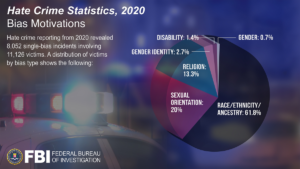
Hate crimes are among the vilest acts committed between two or more human beings. They are often violent actions directed at an individual or group based on their gender, gender identity, race, religious beliefs, ethnic background, or sexual orientation. Some of the more common forms of hate crimes include property damage, verbal abuse, and most frequently, physical assaults.
Every form of hate crime is illegal. There are many laws specifically forbidding them that go into great detail about what constitutes a hate crime. One such statute in the United States explains that it is not lawful for anyone to “willfully injure, intimidate, or interfere with any person, by force or threat, because of race, color, religion, or national origin.” This decree makes it a federal offense to participate in any crime of this nature.
In 1994, federal regulations against hate crimes were strengthened by the passing of the Violent Crime Control and Law Enforcement Act. The act served to increase the level of punishment that was given to anyone convicted of committing a federal hate crime. A subsection of this ruling includes the Violence Against Women Act, which provides nearly $2 billion in funding towards the study and prevention of crimes executed against women.
45 states in America have laws that prohibit any type of hate crime against an individual or group. Such acts incur a criminal penalty, and in 31 states, any person found guilty of these charges may also be fined for their deeds. These laws are designed to be tough and to discourage any forms of persecution.
The FBI documents hate crimes that are reported in America every year. Their studies indicate that in 2013 there were 5,928 hate crimes committed and 6,933 people victimized. These startling statistics show how prevalent hate crimes are even in modern society and reinforce the importance of strong laws and federal action to prevent such acts from happening.
